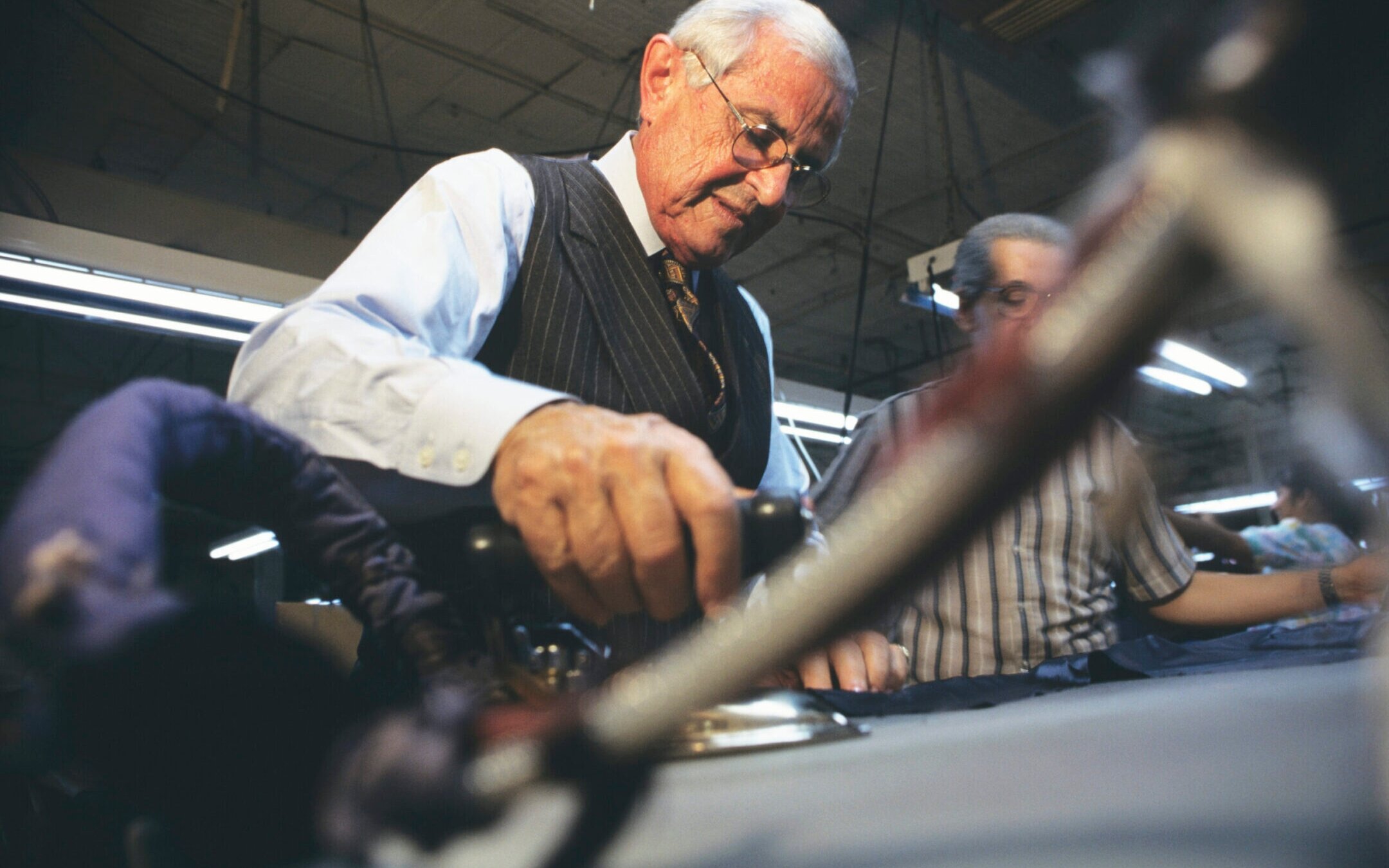Martin Greenfield, Auschwitz survivor and master tailor to American presidents, dies at 95
‘Receiving your first tailoring lesson inside a Nazi concentration camp was hardly the ideal apprenticeship,’ Greenfield once recalled

Martin Greenfield, tailor for Bill Clinton and Colin Powell, in his Brooklyn shop. (Photo by Mark Peterson/Corbis via Getty Images)
(New York Jewish Week) — Martin Greenfield was a prisoner in Auschwitz, working in the laundry, when he accidentally tore an SS soldier’s shirt. When the soldier finished flogging the teen, Greenfield took the shirt to another prisoner who taught him how to sew a simple stitch.
After fixing the soldier’s shirt he slipped it on under his striped prisoner uniform, and learned that just wearing a Nazi’s discarded shirt — and a second one he managed to procure — gave him new status among his fellow prisoners.
“The day I first wore that shirt was the day I learned clothes possess power,” Greenfield wrote in his 2014 memoir, “The Measure of a Man.” “Clothes don’t just ‘make the man,’ they can save the man. They did for me.”
Indeed, Greenfield would survive Auschwitz and Buchenwald, immigrate to the United States, and become a master tailor who dressed a series of presidents from Dwight Eisenhower to Barack Obama. His Brooklyn-based company crafted private-label suits for everyone from Donna Karan to Brooks Brothers to Band of Outsiders, as well as bespoke wares under his own name.
Greenfield died on Wednesday at a hospital in Manhasset, New York. He was 95.
Working out of a third-floor office in his East Williamsburg factory, Greenfield became one of the best-known — and some would say best — men’s tailor in the United States. As late as 2014, when he was profiled in Vanity Fair, his suits had taken on a new cachet among customers who preferred to buy “locally sourced” wares when much of the needle trade had migrated overseas.
Less well known was his survivor’s tale, a story of hardship and resilience he kept secret for decades.
“For 40 years, I didn’t talk about my past to anybody . . . ever,” he told Vanity Fair. “A lot of my clients were shocked when they came to a celebration when I was 80 years old to see that I was a refugee, a survivor.”
Maxmilian Grünfeld was born August 9, 1928, in Pavlovo, a village in what was then Czechoslovakia and is now Ukraine. At 14, he was rounded up and shipped to Auschwitz with his family: his father Joseph, his mother Tzyvia, sisters Simcha and Rivka and their baby brother, Sruel Baer. Only Martin would survive.
He was liberated at Buchenwald by the U.S. Army in April 1945, when he got to shake hands with a future client: Eisenhower, who was the Allied commander. After a fruitless two-year search for family members in Europe, Greenfield was 19 when he immigrated to the United States in 1947 and, on the recommendation of a fellow Czech immigrant, got his first job at the GGG clothing factory in East Williamsburg.
In 1977 he would take over the company and rename it Martin Greenfield Clothiers, which grew from six employees at the time to 117 by 2010.
When Eisenhower, then preparing to run for the presidency, became a client, Greenfield would slip notes into his suits offering foreign policy advice.
Stories about those notes became so widely known that another client, President Bill Clinton, reportedly told him, “Don’t send me notes; you can fax them.”
Among his other clients were Presidents Lyndon B. Johnson, Gerald Ford and George H.W. Bush; General Colin Powell; entertainers Frank Sinatra, Paul Newman, Leonardo DiCaprio, Conan O’Brien, Jimmy Fallon, Johnny Depp and Ben Affleck; and former New York City Mayor Michael Bloomberg.
He also created the suits for the 1920s-set HBO television show “Boardwalk Empire.”
Greenfield is survived by his wife, Arlene, to whom he was married in 1956; two sons, Tod and Jay, and four grandchildren. He was a benefactor of The Hampton Synagogue on eastern Long Island.
“Of course, receiving your first tailoring lesson inside a Nazi concentration camp was hardly the ideal apprenticeship,” Greenfield recalled in his memoir. “I would have much preferred to hone my craft on Savile Row or in the mills of Milan. Looking back, though, that moment in the camps marked the beginning of the rest of my life. Strangely enough, two ripped Nazi shirts helped this Jew build America’s most famous and successful custom suit company.
“God has a wonderful sense of a humor.”
This article originally appeared on JTA.org.
A message from our CEO & publisher Rachel Fishman Feddersen
I hope you appreciated this article. Before you go, I’d like to ask you to please support the Forward’s award-winning, nonprofit journalism during this critical time.
We’ve set a goal to raise $260,000 by December 31. That’s an ambitious goal, but one that will give us the resources we need to invest in the high quality news, opinion, analysis and cultural coverage that isn’t available anywhere else.
If you feel inspired to make an impact, now is the time to give something back. Join us as a member at your most generous level.
— Rachel Fishman Feddersen, Publisher and CEO